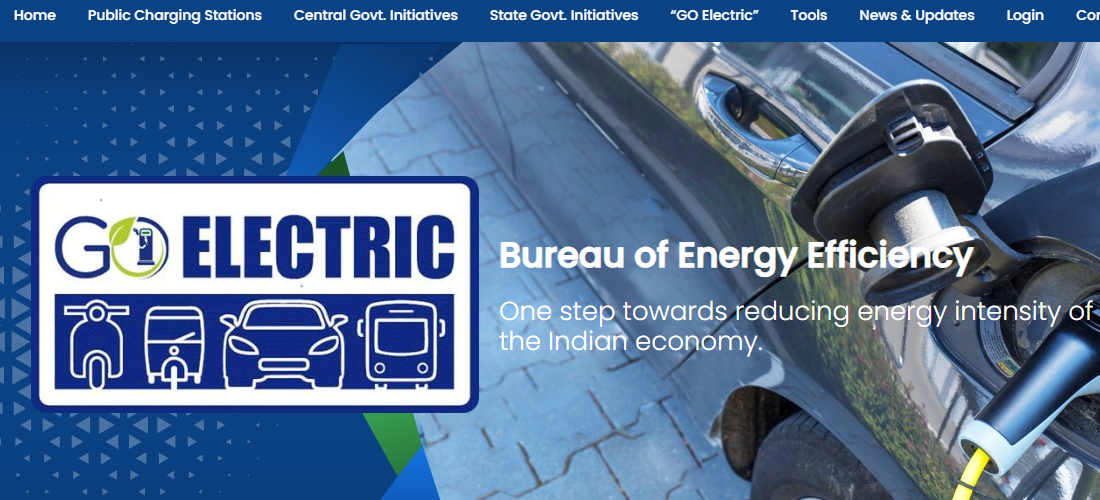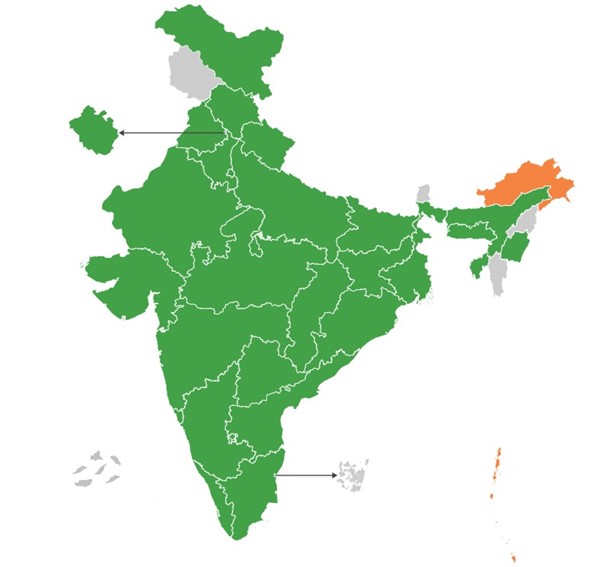Objective
The transport sector accounts for 18% of total energy consumption in India. This translates to an estimated 94 million tonnes of oil equivalent (MTOE) energy. If India were to follow the current trends of energy consumption, it would require an estimated 200 MTOE of energy supply annually, by the year 2030 to meet the demand of transport sector. At present, this demand is being met mostly through imported crude oil, which therefore makes this sector vulnerable to the volatile International crude oil prices. Moreover, the sector also contributes an estimated 142 million tonnes of CO2 emissions annually, out of which 123 million tonnes is contributed by the road transport segment alone. Also, keeping in view the climate change commitments made by Government of India during the COP21 Summit held at Paris to reduce emission intensity by 33- 35% by 2030 from 2005 levels, it is pertinent to introduce alternative means in the transport sector which can be coupled with India’s rapid economic growth, rising urbanization, travel demand and country’s energy security. Therefore, switching to sustainable transportation options, would be beneficial not only for the environment but will also reduce India’s oil import dependency.
Background
Electric mobility presents a viable alternative in addressing these challenges, when packaged with innovative pricing solutions, appropriate technology and support infrastructure and thus, has been on the radar of Government of India. Electric mobility will also contribute to balancing energy demand, energy storage and environmental sustainability. Electric Vehicles (EVs) could help diversify the energy needed to move people and goods thanks to their reliance on the wide mix of primary energy sources used in power generation, greatly improving energy security. Thanks to their storage capacity, they could help support the uptake of clean electricity, enabling greater use of variable renewable in electricity production. If coupled with the decarbonization of the power sector, EVs would also provide major contributions to keep the world on track to meet its shared climate goals.


Electric mobility comes with zero or ultra-low tailpipe emissions of local air pollutants and much lower noise, and, by being one of the most innovative clusters for the automotive sector, can provide a major boost to the economic and industrial competitiveness, attracting investments, especially in countries.
EV industry in India is in nascent stage, with less than 1% share in total vehicle sales.
For uptake of EVs in India, government of India have undertaken multiple initiatives to promote manufacturing and adoption of EVs in India. With support of the government, EVs have started penetrating in the Indian market. However, availability of adequate Charging Infrastructure is one of the key requirements for accelerated adoption of EVs in India. BEE has been nominated as the Central Nodal Agency for EV Public Charging Infrastructure by MoP. To support Central Nodal Agency, every State government have appointed State Nodal Agency for rollout of EV Public Charging Infrastructure.
Status/ Acheivements
Some of the initiatives undertaken by various government departments / agencies is depicted below:
2010
- Ministry of New & Renewable Energy (MNRE): Alternative Fuel for Surface Transportation Program (Manufacturing Promotion, Services Development, Demand Creation, Research & Development)
2012
- National Electric Mobility Mission Plan (Manufacturing Promotion, Services Development, Demand Creation, Research & Development)
2015
- Faster Adoption and Manufacturing of Electric Vehicle (FAME) (Demand Creation, Subsidy Allocation, Research & Development)
2016
- Formation of Electric Mobility Programme Management Cell led by Prof. Ashok Jhunjhunwala (IIT Madras) (Manufacturing Promotion, Services Development, Demand Creation, Research & Development)
2017
- National Electric Mobility Mission Plan (Manufacturing Promotion, Services Development, Demand Creation, Subsidy Allocation, Research & Development)
- FAME Scheme Rs. 437 crore subsidy to 11 Cities (Services Development)
2018
- State EV Policy: Andhra Pradesh, Maharashtra (Manufacturing Promotion, Services Development, Demand Creation, Subsidy Allocation, Research & Development)
- MoP: Charging as a Service (Services Development)
- MoP: Nationale-mobility programme (Services Development)
- MORTH: Green registration plates for EVs (Services Development)
- GST reduction on Li-ion batteries and Fuel Cell Vehicles ( Manufacturing Promotion, Services Development)
2019
- MOHUA: 20% EV parking space in residentialand commercial buildingI ( Manufacturing Promotion, Demand Creation )
- NITI Aayog: National Mission on Transformative Mobility and Battery Storage (Manufacturing Promotion, Demand Creation, Research & Development)
- FAME Scheme Phase II (Manufacturing Promotion, Services Development, Demand Creation, Subsidy Allocation)
- Central Board on Indirect Taxes and Customs duty for EV Components by 50% (Manufacturing Promotion)
- Phased Manufacturing Plan: Tax duty structure for manufacturing in India
- MoP: Revised guidelines for Public Charging Infra. and Related Safety Guidelines( Services Development )
- State EV Policy: Kerala, MP, Tamil Nadu, UP, Bihar, Uttarakhand, Gujarat, Punjab (Manufacturing Promotion, Services Development, Demand Creation, Subsidy Allocation, Research & Development)
2020
- MoP: Notification on EV ChargingTariff ( Services Development )
- State EV Policy: Delhi, Telangana (Manufacturing Promotion, Services Development, Demand Creation, Subsidy Allocation, Research & Development)
2021
- MoP: Launch of GO ELECTRIC Campaign
- State EV Policy: Odisha, Meghalaya, West Bengal (Manufacturing Promotion, Services Development, Demand Creation, Subsidy Allocation, Research & Development)
2022
- Hon’ble President of India launched “EV Yatra” web-portal and mobile application on the National Energy Conservation Day 2022, 14th December 2022, the flagship program of BEE. The “EV Yatra” web-portal and mobile app are aimed at creating awareness among the EV users and masses at large to promote e-mobility in the country. EV Yatra web-portal can access through link - https://evyatra.beeindia.gov.in/
2023
- Ministry of Power issued amendments in the revised consolidated Guidelines & Standards for Charging Infrastructure for Electric Vehicles on 27.04.2023.
- Central Electricity Authority (CEA) has notified additional safety requirements for electric vehicle charging stations in chapter-XI of Measures relating to Safety and Electric Supply on 08.06.2023.
- Ministry of Housing and urban affairs has issued the for PM e-BUS Sewa on 25.08.2023. The PM e-BUS Sewa scheme is for augmenting city bus operation by 10,000 e-buses on PPP model. The Scheme would have an estimated cost of Rs.57,613 crore, out of which support of Rs.20,000 crore will be provided by the Central government. The Scheme will support bus operations for 10 years.
Highlights
At the subnational level, 29 States have issued EV Policy while three states EV Policies are in draft stage. Below is the India map showing notified and draft EV policies in the country:

Target Beneficiaries and Partners
For the promotion of electric mobility in the country, BEE is working with various department / agencies across all the States by organizing various awareness campaigns, roadshows, workshop / seminar. Below is the pictorial representation of stakeholders across the e-mobility ecosystem:

Important Information for Consumers/Stakeholders & Useful Links (Electric Mobility)
- State EV Tariff – Annexure A (Size: 219KB, Format: pdf, Language: English)
- Tentative Ownership Cost Calculator (EV V/S ICE Vehicles) for Home Charging
- State Nodal Agencies under the provision of “Charging Infrastructure for Electric Vehicles-Guidelines and Standards” issued by Ministry of Power – Annexure B (Size: 53 KB, Format: PDF, Language: English)
- "Charging infrastructure for Electric Vehicles(EVs)-Revised Guidelines and Standards" issued on 01.10.2019 (Size: 2.3 MB, Format: PDF, Language: English)
- "Charging Infrastructure for Electric Vehicles (EV) – the revised consolidated Guidelines & Standards issued on 14th January 2022 (Size: 7.4 MB, Format: PDF, Language: English)
- Amendments in the revised consolidated Guidelines & Standards for Charging Infrastructure for Electric Vehicles on 27.04.2023
- "Amendment_to_revised_consolidated_Guidelines_dated_14012022 (Size: 7.4 MB, Format: PDF, Language: English)
Contact Details of Concerned Officials of BEE
|
S.No. |
Programme Officer |
Concerned Area |
Contact Details |
|
|---|---|---|---|---|
|
1 |
Shri. Sameer Pandita, Director |
E-Mobility |
011-26766749 |
spandita@beeindia.gov.in |
|
2 |
Shri. Rahul Juyal, Sector Expert |
E-Mobility |
|
rahul.juyal@beeindia.gov.in |





